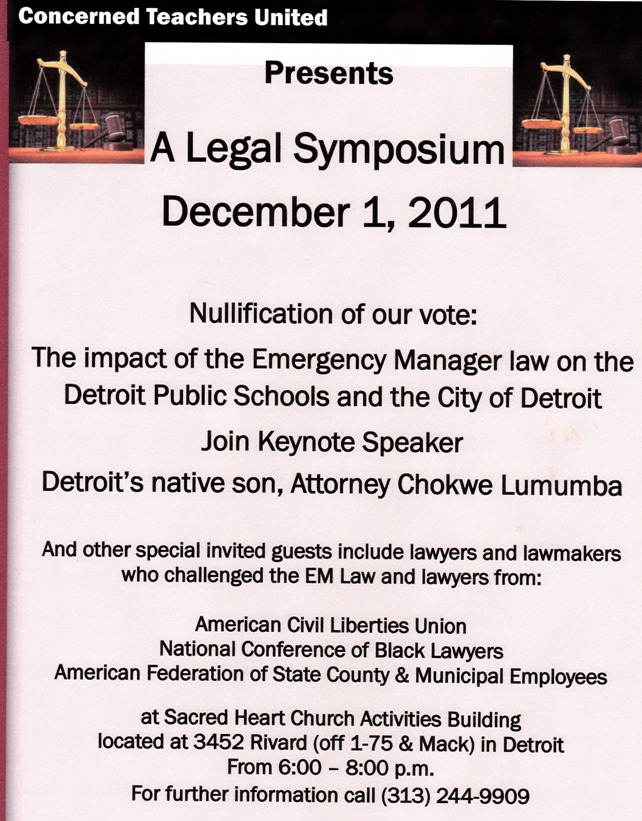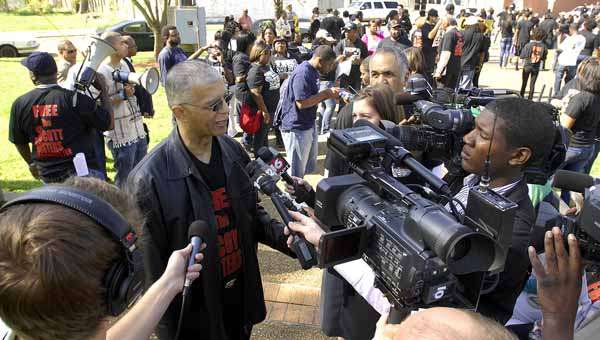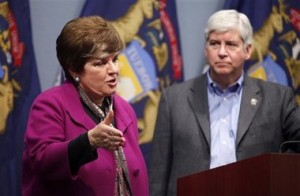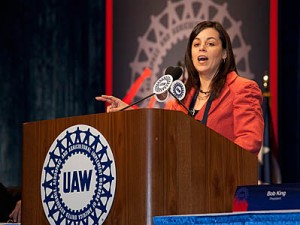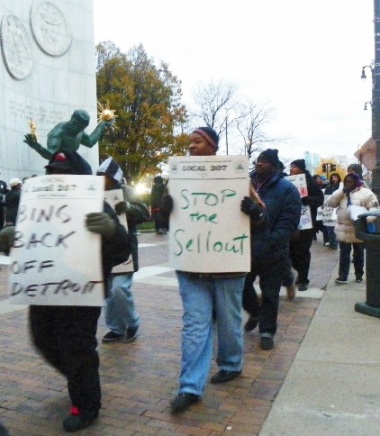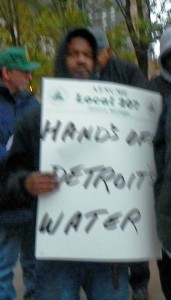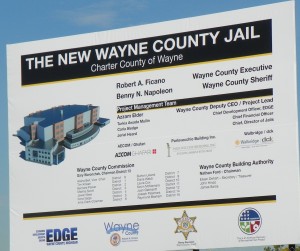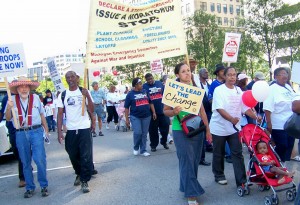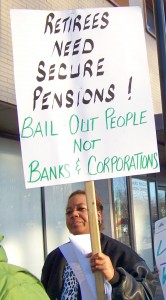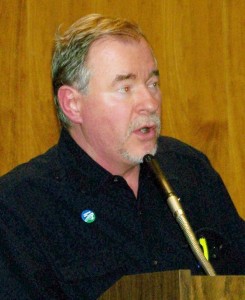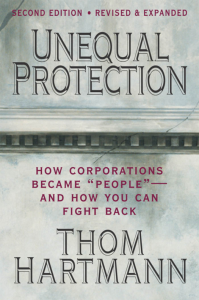VOD NEEDS DONATIONS NOW–LINKS IN STORIES
VOD WELCOMES NEW SUBMISSIONS!
If you want to be published on VOD, please submit your articles, etc. to diane_bukowski@hotmail.com. Call 313-825-6126 to alert us.-
Recent Posts
- DEATH OF IMAM JAMIL AL-AMIN/H.RAP BROWN REIGNITES DEMANDS FOR JUSTICE, RECOGNITION OF HIS HEROIC LIFE
- SENTINEL REPORT: KYM WORTHY, CIU’s, DPD, SADO LEAVE MASSES OF WRONGLY CONVICTED TO ROT AND DIE IN MDOC
- FREE WRONGLY CONVICTED LIFER DAVID MCKINNEY, CHARGE INKSTER COPS ANTHONY DELGRECO, OTHERS
- LET OUR BROTHERS GO! RICKY RIMMER, GREGORY ALLEN, DESHON STOKES! SAT. OCT. 11 @12 NOON MLK JR. HIGH
- WRONGLY CONVICTED, MICHEAL ‘MIKE D’ DEGRAFFINRIED FREED AFTER 26 YRS; NEW TRIAL HEARINGS OCT. 9, NOV. 11
- COUNCIL CANDIDATE JAMES HARRIS’ S.T.R.E.S.S. COP, DRUG DEALER DAD BUSTED BY FEDS; SPENT 20 YRS. IN PRISON
- WOMEN AT HURON VALLEY PRISON WIN FED. COURT RULING BLASTING HORRIFIC CONDITIONS, DENYING MDOC IMMUNITY
- FREE RICKY RIMMER! DETROIT MAYORAL CANDIDATE ATTY. TODD PERKINS MEETS WITH RR’S SUPPORTERS JUNE 8
- DONATE TO VOD BEFORE JUNETEENTH! KEEP STORIES OF CONVICTIONS BY CROOKED COPS, PROSECUTORS ON-LINE
- CEDRIC TOOKS HOME AFTER 47 YRS, RESENTENCED AS 18-YR. OLD JUVENILE, LEADS WAY FOR HUNDREDS MORE
- MICH. SUPREME COURT ORDERS RESENTENCINGS FOR LIFERS AGED 18, 19, 20, AFFECTING AT LEAST 830 IN MDOC
- WE REMEMBER AFENI SHAKUR JAN. 10, 1947 – MAY 2, 2016; “BLACK PANTHER PARTY HISTORY IS WOMEN’S HISTORY”
- PROF. PENNY GODBOLDO, DR. MARGARET BETTS SPONSOR “MEDITATION MOVEMENT & MEDICINE” SAT. MAR. 29 10A-2P
- MICH. SUPREME COURT TO RULE RE: LIFERS CONVICTED UNDER 21, OTHERS CHARGED WITH FELONY MURDER
- DUGGAN’S DECADES-LONG DETROIT DEMOLITION DERBY
- ATTEND FRIENDS OF RETURNING CITIZENS (F.O.R.C.) SUPPORT GROUP MEETINGS TUESDAYS 6 – 7:30 PM
- EXONEREE THELONIOUS SEARCY PACKS COURT; JUDGE DELAYS RE-TRIAL, DENIES TETHER REMOVAL PER NESSEL
- FREE DOUBLE R IN 2025! DETROIT PROTESTS FOR RICKY RIMMER FORCED ACTION, CASE GOING TO APPEALS COURT
- CHARGES DISMISSED VS. DEMETRIS ‘MEECH’ KNUCKLES EL, COUSIN JAN. 16, 2025; TONS OF SUPPORTERS SHOWED
- FIGHT THE POWER! JOIN THELONIOUS ‘SHAWN’ SEARCY IN COURT FRI. JAN. 10 VS. ‘INNOCENCE DENIER’ KYM WORTHY
- DONATE TO VOD IN 2025! HELP EXPOSE CRIMES OF COPS, PROSECUTORS, JUDGES WHO FRAMED 1,000’S IN MDOC
- GAYELON SPENCER, JR. FIGHTS MURDER 2 CONVICTION: COPS DESTROYED EVIDENCE, BIASED MEDIA COVERAGE
- WILLIE MERRIWEATHER MEMORIAL SAT. DECEMBER 14, 4PM: HERO WHO GAVE HIS LIFE TO SAVE OTHERS FROM PRISON
- DIRTY DETROIT COPS BEAT, MADE UP CONFESSIONS FROM ALTON HUBBARD, BROTHER IDOLTHUS, IN 2004 MURDERS
- ROGER CARLOS RAY WINS EVIDENTIARY HEARING ON 3RD TRY; EXONEREE LAVONE HILL CALLS FOR RAY’S RELEASE
Monthly Archives
Links
- Al Jazeera news
- All of Us Or None, prisoners and former prisoners
- All-African People's Revolutionary Party
- American Tribune, the prison experience
- Black Agenda Report
- Black is Back Coalition
- Black List
- Block Report Radio
- Color Lines
- DBA Press
- Defend Freedom of the Press
- Detroit Parents with Special Ed Students
- Free Mumia Abu Jamal
- Free Mumia Abu Jamal news
- Gray Zone
- Hood Research
- Jamahiriya News Agency–Free Libya
- Kenny Snodgrass: You Tube
- Labor Notes
- Libya 360
- Mac Speaking: Leona McElvene YouTube site
- Maryanne Godboldo
- MI Emergency Ctte. v War & Injustice
- Michigan Welfare Rights Organization
- Monthly Review Online
- Nadir's Detroit music scene
- Photography is Not a Crime
- Press TV world news
- Prison Legal News
- Project B.A.I.T.
- Real News Network
- Russia Today
- San Francisco Bay View newspaper
- SCG News: World News, Politics and Analysis
- THE GRAYZONE
- We the People of Detroit
- Wikileaks
NOV. 28 PROTEST TARGETS STATE’S ‘ROCKET DOCKET’ WELFARE CUTS HEARING PROCESS
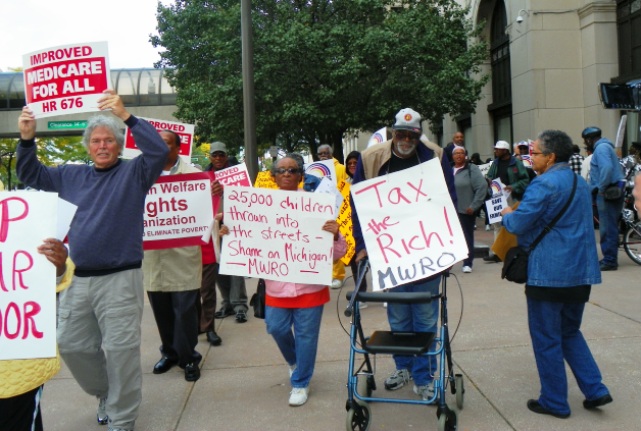
The Michigan Welfare Rights Organization sponsored this protest Sept. 29, 2011 against proposed cuts to cash assistance for poor.
Release by UAW Local 6000
More than 900 of Michigan’s poorest families losing cash assistance – and chance to appeal
DETROIT – Here’s something else to be thankful for this Thanksgiving: On Nov. 28, protesters will rally to remind those who support corporations over Michigan’s poor that the 99 percent will not stop fighting until social and economic justice is a reality for all.
Beginning Oct. 1, nearly 12,000 families of Michigan’s poorest of the poor – including over 29,000 children – were thrown off the state’s cash assistance programs to fund tax breaks for corporations. The new law, which limits Michigan residents to 48 months of lifetime welfare cash benefits, was passed by the majority Republican legislature and signed by Republican Gov. Rick Snyder in September.
The 929 families who believe their cash assistance shouldn’t be discontinued have filed appeals.
But adding insult to injury, the Michigan Department of Human Services (DHS), directed by former state Supreme Court justice Maura Corrigan, instituted the so-called “Rocket Docket” system to quickly dispose of those appeals cases.
Hearings are scheduled for Nov. 28-29 at DHS offices across the state.
“UAW Local 6000 members are on the front lines every day to work for Michigan families and help them navigate a welfare system that’s getting meaner by the day,” said UAW Vice President Cindy Estrada, who directs the union’s Public Sector and Health Care Servicing Department. “Our members who work at DHS offices as social workers and welfare eligibility specialists are outraged by the new law and the insidious ‘Rocket Docket’ system instituted under the guise of saving taxpayer dollars.
“We don’t want to see 29,000 more of Michigan’s poorest children thrown into deeper poverty,” Estrada added.
Here are details about Monday’s event:
Who: Cindy Estrada, UAW vice president; UAW Local 6000 members; retirees and community leaders; Michigan State Sens. Tupac A. Hunter and Coleman A. Young II; Michigan Reps. Fred Durhal Jr. and Rashida Tlaib.
What: Protest of state’s “Rocket Docket” hearing process to accelerate denial of cash assistance benefits to poor families.
When: Monday, Nov. 28, at 8 a.m.
Where: Michigan DHS office, 14061 Lappin, Detroit, MI 48205 (near Seven Mile Road and Gratiot)
STOP THE ATTACKS ON CITY, COUNTY & DETROIT PUBLIC SCHOOL WORKERS
Stop the Corporate Austerity Drive that is Pushing Us into Poverty
Statement issued by public workers unions at November 17 rally at CAYMC
This country is not broke. The top tiers of our nation continue to grow more obscenely wealthy as the gap between the rich, and the poor, working class and even middle-class grows wider each year. The banks and corporations are draining the people like a gang of vampires, intent on lowering our living standards and expectations for decent futures. The richest Americans are concentrating the nations’ wealth and forcing austerity on the rest of us. Draw the line now!
After failing Detroiters as mayor, Dave Bing is now openly campaigning for Republican Governor Rick Snyder to appoint him as the Emergency Manager (Dictator) of the city. He wants this power so he can carry out the drastic down-sizing, down-grading, degrading and racist changes that big business requires from Detroit, including cutting off gas, light and services to huge swaths of the city!
On November 4th, Republican Federal Judge Sean Cox issued an order which was supposed to stop the Detroit Wastewater Plant from polluting the river. Instead, his order cripples Detroit Water & Sewerage Department unions’ ability to represent their members, attacks seniority rights and voids Detroit residents’ legal right to vote on the privatization or selling of the DWSD’s assets. Judge Cox’s order threatens all unions in the public and private sectors with similar attacks, and negates the democratic rights of residents everywhere.
After illegally laying off public lighting repair workers, Bing and the City Council are paying DTE to repair the lights at a vastly inflated labor costs. The city is appealing a judge’s ruling to reinstate the workers.
After forcing contract concessions on Detroit City workers in 2009-10, Mayor Bing is now insisting on more give-backs, including: a 10% pay cut (to replace furloughs, so he can layoff more workers). He also wants a 300% increase in health insurance pay check deductions for most workers, and dramatically higher out-of-pocket costs. The bleeding of Detroit City workers and the cut-back of services to Detroiters must stop now.
Bus service in Detroit and the surrounding area is constantly being reduced and bus drivers are being assaulted. After cutting the number of bus mechanics, Bing then falsely accused them of “slowing down.” And management still refuses to provide mechanics with the parts necessary to repair the buses.
Wayne County officials have been exposed as corrupt paid puppets of big business, pocketing payoffs while forcing “austerity measures” on County workers which have drastically reduced their living standards and cut social services to county residents.
Years of undemocratic state control of Detroit Public Schools has led to more debt, less public schools, more profit-motivated charter schools, poorer education and attacks on school unions. Much of the school support services have been privatized and workers forced to reapply for their own jobs! The appointed DPS Emergency Manager is continuing his job of destroying public education while receiving open payoffs from corporations.
November 17 Rally Sponsored by AFSCME Locals 101 (Wayne County Road Commission), 207 (DWSD), 345 (DPS Support Staff) & 1659 (Wayne County), Teamsters Local 214, Amalgamated Transit Union Division 26, Peoples Water Board. .
For information on upcoming activities against the cutbacks, call 313-965-1601, 313-995-5691. AFSCME Local 207’s website is www.afscme207.com/
DETROIT CRISIS A CRIMINAL HOAX?
Are Snyder, Bing, Council and EY conspiring to get concessions or EM?
PA 4 (EM law) may be frozen by mid-December, as referendum petition nears signature goal
Council handing out tax abatements as it demands 2300 lay-offs
By Diane Bukowski
November 26, 2011
DETROIT – Are Mayor Dave Bing and the City Council manufacturing an economic crisis in collusion with Ernst & Young as well as Michigan Gov. Rick Snyder? Are they trying to force “sacrifice” out of the city’s workers and poor while allowing the city’s corporations and banks to make hay while the sun shines?
VOD reader S. Mack said it all in a recent on-line comment.
“A Forensic Audit is needed to catch these crooks from the past to the present administrations,” Mack noted. “We need an honest outsider to do the Audit. It’s not hard to see things are purposely in place to continue to give away assets and to privatize, regionalize and corporatize the city.
“[It is] also population control to remove one group for another, [and] an attack on the poor, a cause and effect to raise the poverty numbers in this City, while they give the banks, corporations, casinos and big businesses a pass. Tax abatements should be a thing of the past. There are businesses who haven’t paid taxes in thirty years or more, rich taxpayers who don’t live in the city. Millions of federal dollars are sent back instead of being utilized to build economic wealth for the city. You gotta believe things are being done deliberately.”
PA 4 could be frozen by mid-December
The recent sequence of events raises the possibility that there is a deliberate effort to put an EM over Detroit, or at least to bleed concessions out of the unions, before Public Act 4 is frozen. That could happen as early as mid-December.
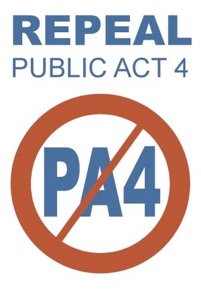 In a recent release, Michigan Forward said regarding its campaign for a referendum to repeal PA4, “Stand Up for Democracy is announcing it has verified more than half of the 250,000 signatures the group wants to collect. Only 161,304 valid signatures are needed to freeze the emergency manager law and put it on the November 2012 general election ballot.”
In a recent release, Michigan Forward said regarding its campaign for a referendum to repeal PA4, “Stand Up for Democracy is announcing it has verified more than half of the 250,000 signatures the group wants to collect. Only 161,304 valid signatures are needed to freeze the emergency manager law and put it on the November 2012 general election ballot.”
Michigan Forward is a state-wide coalition of labor, community and religious leaders. Its founder Brandon Jessup said they expect to have enough signatures by mid-December.
Michigan’s Constitution, Art. II, Sec. 9 says, “No law as to which the power of referendum properly has been invoked shall be effective thereafter unless approved by a majority of the electors voting thereon at the next general election.”
(Click on http://voiceofdetroit.net/2011/07/07/labor-community-gear-up-to-deliver-fatal-blow-to-pa-4/ to read previous VOD article on campaign to defeat PA 4.)
Snyder becomes bad cop
Snyder appears rather concerned. After Bing timorously raised Councilwoman JoAnn Watson’s demand that the state repay $220 million it owes to Detroit, the governor suddenly turned from good cop, claiming he did not want an EM for Detroit, into bad cop.
“Based on the mayor’s remarks … and the severity of the situation he described, we anticipate he will be submitting a request for preliminary financial review in the near future,” Snyder said.
Bing said that he has been in constant consultation with Snyder on the city’s finances since April and that therefore a preliminary review, the first step in naming an EM, is not needed. So does he plan to skip straight to the second step and ask for one? The daily media is saying that folks like the current EM’s of Benton Harbor, Pontiac, and Ecorse are under consideration. A city hall insider told VOD there are also local names in the pot.
A union official who asked not to be named told VOD that his department is paying bills from private corporations within two to three days in an apparent effort to spend down as much money as possible, to verify the claims of a pending cash shortfall made by Bing, the Council, and Ernst & Young.
(Go to http://voiceofdetroit.net/2011/11/15/ernst-young-helped-lehman-bros-cook-books-say-n-y-n-j-lawsuits/ and http://voiceofdetroit.net/2011/11/21/city%e2%80%99s-top-criminals-ernst-young-cook-the-books/ to read VOD’s previous articles exposing this criminal firm.)
Frantic meetings Thanksgiving week, turkey and shopping 24th and 25th
Bing, the Council, and the city’s unions met frantically during Thanksgiving week, claiming that an EM would be named any moment.
The situation could not have been so dire, however. Mayor and Council went home Thursday and Friday to consume their turkey, and take advantage of “Black Friday.” Council President Charles Pugh was spotted by a local TV station shopping his well-heeled self off at an upscale store Friday.
Perhaps Councilwoman Saunteel Jenkins, who has proposed that city retirees give up their 13th check, was busy snuggling with her presumed squeeze Carl Bentley while filling up on Thanksgiving goodies to add to her steadily increasing girth. The two have been photographed together at numerous society functions.
Bentley works for Strategic Staffing Solutions, a city and county contractor now under investigation by the feds for its role in the Wayne County Business Development Corporation scandal.
Council demands 2300 lay-offs, based on secret Ernst & Young meeting
The City Council sank to new depths of depravity in the sessions it conducted during the first three days of the week. On Nov. 22, they spent the afternoon debating whether a demand for 2300 city worker lay-offs should be number one on a list to present to Mayor Bing, or whether the state’s $220 million debt to the city should go first.
In the end, NO ONE would give a definitive “NO” vote against presenting the 2300 lay-offs as one option, and only JoAnn Watson appeared to believe that the demand for the state debt repayment was serious.
They also disclosed that actual representatives of Ernst & Young were present during their secret meeting they held with Bing about the city’s finances Oct. 26, in violation of the Open Meetings Act.
VOD is consulting with the On-Line Media Network to obtain legal assistance in filing suit against the Council for holding that meeting. Two other suits are contemplated regarding a closed Council session on the $750,000 DTE Energy contract to repair 500 streetlights, and another on revamping the city’s Privatization Ordinance.
Violation of the Open Meetings Act under state law is a criminal misdemeanor. (Where’s Wayne County Prosecutor Kym Worthy when we need her?)
Happy Thanksgiving! Council hands out tax abatements, not turkeys
Prior to discussing how to bleed city workers, the Council took care of other business, happily handing out holiday gifts in the form of tax abatements. After all, companies like Covanta, witn about $1.7 billion expected in 2011 revenues, can certainly afford to buy their own turkeys.
The Council voted 5-4 in favor of a $4.1 million brownfield development tax abatement for Covanta subsidiary Detroit Renewable Power, which operates the Detroit and Hamtramck incinerators. The incinerators are reviled by environmentalists and hundreds of people who live in the path of their fumes. Detroit Renewable Power was recently cited by the state for several environmental infractions, as several of the many speakers against the abatement pointed out.
“Covanta Energy is one of the world’s largest owners and operators of infrastructure for the conversion of waste-to energy, as well as other waste disposal and renewable energy production businesses,” the company says on its website. “Covanta operates and/or has ownership positions in 44 energy-from-waste facilities, primarily located in North America, and 20 additional energy generation facilities, including other renewable energy production facilities in North America. “
The company has also been cited for numerous environmental infractions and labor violations.
The five Council members voting for Covanta were Black Friday shopper Charles Pugh, Bentley squeeze Saunteel Jenkins (who got $1,000 from Covanta during her campaign), Gary Brown, Andre Spivey and James Tate. Voting against the tax abatement were Council members JoAnn Watson, Brenda Jones, Kwame Kenyatta, and Ken Cockrel, Jr.
Big Tax Break for Detroit Incinerator: MyFoxDETROIT.com
The Council additionally voted 8-1 to give Wayne County Executive Robert Ficano a zoning change so he could build his new county jail.
Councilwoman Watson thought to ask, “Who’s the contractor?” knowing it is Walbridge Aldinger. The FBI has also subpoenaed records from that company, whose CEO John Rakolta sits on the Wayne County Business Development Corporation board and on the EDGE non-profit board. He is an ardent Snyder supporter, and was a major fundraiser for the 2004 Bush campaign.
Over the past few weeks, the Council has also voted to give 10 and 15 year Renaissance Zone tax credit extensions to the James Group International/OJ Land Development and 1208 Woodward, LLC, in exchange for a guarantee of —ELEVEN JOBS.
Meanwhile, the council approved city revenue INCREASES of over $2.7 million from the state, casinos and elsewhere, but said they would be used in large part to pay for the Ernst & Young contract. (Click on Detroit revenue increase slated for Ernst Young.)
So, the question becomes—is there a crisis or not? Previously Wall Street screamed crisis at Detroit Mayor Kwame Kilpatrick over an alleged $300 million deficit in 2005. It sent its minions from Standard and Poors and Fitch Ratings directly to the Council table to demand that the city borrow $1.2 BILLION in pension obligation certificates. The Mayor and council caved.
When the city was in danger of defaulting on same, in 2009, Mayor Ken Cockrel, Jr. agreed to turn ALL of the city’s revenue-sharing and casino tax income over to a bank trustee so he could chop off what UBS Financial Services considered sufficient to stave off default on the debt Wall Street demanded.
What other ingenious and eventually catastrophic solution does Wall Street have in mind for Detroit now?
_______________________________________________________________
Moratorium Now! Coalition to Stop Foreclosures, Evictions & Utility Shut-offs — Organizing Meeting
Monday, November 28, 2011, 7:00 pm
5920 Second Ave., Detroit, MI 48202 (at Antoinette, just north of Wayne State University)
We will be discussing actions in coordination with Occupy Detroit in support of the December 6 National Day of Action Against Foreclosures.
We will also take up the fight against the imposition of an Emergency Financial Manager on the City of Detroit.
THOUSANDS OF DEFENDERS MOBILIZE TO STOP POLICE EVICTION OF OCCUPY LA, SET FOR NOV. 28
‘Occupy LA under attack,’ ‘The people can stop the eviction’
Sign petition to stop eviction Click here; call Mayor Antonio Villaraigosa at (213)978-0600,
Occupy LA website: http://occupylosangeles.org/
Human Rights Examiner
November 26, 2011 – Like this? Subscribe to get instant updates.
After the LA mayor and city officials pledged to evict Occupy LA human rights defenders from their peaceful 500 tent encampment still at City Hall, in preparation to resist the 12:01 a.m. Monday morning police event, aside from purchasing gas masks, the nation’s largest grassroots human rights organization, ANSWER Coalition late Sunday afternoon has urged thousands of its members and supporters to be at the City Hall at 11 p.m. Sunday night through Monday to and to take a pledge to stop the eviction.
“Occupy LA is under attack,” the ANSWER Coalition says in its written statement sent late Saturday.
Click on http://occupylosangeles.org/?q=nov2011response to read Occupy LA General Assembly’s response to the mayor.
But this morning, there were no signs of attack, although the thousands of rights defenders brace for an interesting time after the clock strikes midnight Sunday when the eviction and police involvement is to occur.
“All was quiet before dawn at Los Angeles City Hall, where “Occupy” demonstrators have been camping since Oct. 1 and are now under threat of arrest if they don’t clear out after noon Monday,” reported the Daily News LA Sunday morning.
There was “no sign that the estimated 500 tents had diminished.”
More than one thousand protesters of Occupy LA hit the streets in solidarity with Occupy Wall Street. They occupied the financial district of Los Angeles and police arrested several of the protesters. RT correspondent Ramon Galindo gives us the latest of the national day of action in LA Nov. 17.
The mayor and city officials pledged to evict Occupy LA from the encampment at City Hall lawn at 12:01 am this coming Monday morning.
“In a press conference yesterday, Mayor Villaraigosa and LAPD Chief Charlie Beck called the ongoing protest ‘unsustainable’ and gave notice of their intention to have Occupy LA dismantled,” reported ANSWER Coalition.
The Daily News reported the mayor wants the people off of City Hall’s “manicured lawns” for “safety reasons.”
But ANSWER Coalition, the metropolitan’s large coalition of human rights defender organizations says they need thousands of recruits to be there late Sunday night to stop the eviction.
“We cannot let this happen,” ANSWER says in its statement urging members and supporters to be there Sunday night through the Monday morning eviction deadline.
“Come by 11 p.m. and be prepared to stay to help stop the eviction. Bring your friends, family and everyone you know, along with any signs or banners you have or wish to make to support Occupy LA.
“If thousands of people come out on Sunday to defend Occupy LA, we will send a strong message to the ruling elite and politicians who desperately want the Occupy movement to end.”
According to ANSWER, despite city officials claiming to support Occupy LA and their passing a resolution to that effect, “they do not and never have” supported it.
“The pending eviction attempt is part of a wave of nationally coordinated state repression against the Occupy movement as a whole.
The blossoming of a new, growing movement of young people, students, workers and unemployed against the wealthiest 1% has challenged the profit-based system that feeds on banker and corporate greed.
Wall Street and the ruling elite in all cities want the Occupy movement gone completely, yet along with others, Occupy LA still stands.”
ANSWER’s rationale is that the people stopped New York City Mayor Bloomberg when he first tried to kick Occupy Wall Street protesters from Zucotti Park.
“Five thousand people answered the call and defended the park, forcing the mayor and city to back down. The same thing can happen right here in Los Angeles,” it says.
“Now is the time to take a stand and defend the Occupy LA encampment, which is comprised of peaceful protesters who are fed up with the rule of the richest banks and billion-dollar corporations–the 1%.
“ANSWER, along with the Occupy LA participants, clergy and other community groups, will be there to support Occupy LA, stop the eviction, and make sure City Hall remains occupied.”
The group is urging people to register for email updates and check the AnswerLA.org website and Facebook page for up to the minute reports.
At least one person admitted to having bought a gas mask in preparation for peaceful resistance Monday morning.
“Click here to pledge to “Take a stand” to defend the Occupy LA encampment,” ANSWER urges.
Suggested by the author:
- Mayor, Police: Occupy LA ‘will not go quietly’ Sunday midnight
- What is human rights group called ANSWER? (Video)
- Rights workers to ICC: Investigate officials for 1000s Mexicans tortured, killed
- Threatened Occupy LA counters mayor, buys gas masks
- Police turn Occupy Oakland’s Thanksgiving into potty riotContinue reading on Examiner.com Breaking News: 1000s rights defenders recruited to stop Occupy LA police attack – National Human Rights | Examiner.com http://www.examiner.com/human-rights-in-national/breaking-news-1000s-rights-defenders-recruited-to-stop-occupy-la-police-attack?CID=examiner_alerts_article#ixzz1eurUJExM
Watch live streaming video from owslosangeles at livestream.com
OCCUPY LA LIVESTREAM
BING, COUNCIL DECLARE WAR ON RETIREES, TRY TO TAKE 13TH CHECK; PUBLIC HEARING TUES. NOV. 29, 9:30 AM

- Workers demonstrate against Bing’s attacks on pension rights and other cutbacks outside his State of the City address April 12, 2011
- 13th check, other pension rights at stake;
- Public hearing Tues. Nov. 29 9:30 a.m. CAYMC, Council chambers
By Diane Bukowski
DETROIT – Detroit Mayor Dave Bing and the City Council are bidding HAPPY HOLIDAYS and thanks to city retirees for their years of service, by trying to snatch their annual “13th check,” which many have counted on for 20 years to pay past due bills or buy Xmas gifts for their families.
A proposed ordinance amending the City Code would also redefine and limit excess earnings on Detroit General Retirement System (DGRS) investments, from which the check is provided, among other strictures placed on the powers of DGRS trustees to distribute funds to retirees.
Council will hold a public hearing on the ordinance, introduced and supported by Council member Saunteel Jenkins, on Tues. Nov. 29 at 9:30 a.m. It plans to vote on the ordinance later that morning. (Click on Proposed pension ordinance for summary of ordinance.)
“These kinds of changes in pension plans are mandatory subjects of bargaining, and would have to be negotiated and agreed to by the parties,” John Riehl told council Nov. 22.
Riehl, a DGRS trustee and president of Local 207 of the American Federation of State, County and Municipal Employees, spoke at a hearing which had to be rescheduled to Nov. 29 because notice of the hearing did not include mention of the 13th check.
He noted that the Michigan Supreme Court declared pension changes a mandatory subject of bargaining as part of their decision in DPOA v. Detroit, 391 Mich 44 (1974).
Bing first raised the idea of taking the 13th check and reducing city contributions to the pension systems during his April 12 budget address, after which he met with system trustees.
“This is a double whammy on the people” Riehl said, referring to an agreement made during that meeting. “We already agreed to allow the city to spread out their payments into the system over a longer period of time.”
William Williams is a city bus driver and officer of Amalgamated Transit Union Div. 26.
“I’ve been in this city all my life,” he told the council. “I’m one of those who stayed when all my friends were moving to Houston and Dallas. It almost brings me to tears to see the city try to fix its condition on the workers’ backs. We’ve given and we’ve given and we have no more to give.”
Cornell Squires is a former City of Detroit EMS technician, retiree and community activist.
He told VOD, “American Axle got city tax abatements but went overseas,” he said. “The Downtown Development Authority and DTE don’t pay taxes. Tell Illitch and all those people running the Fox Theater, Comerica Park, and the casinos, making money every day to come and contribute, not just the workers. It was the people and city workers who kept Detroit going. They’re building up ‘Midtown,’ but there’s no development in the neighborhoods. There are 72.000 vacant parcels. People could come together like on Angels’ Night if they had the money, they could take all the vacant buildings, turn them into gym shoe plants and other factories and provide jobs for city residents who pay taxes.”

DDOT bus driver William Williams talke with City Council members James Tate and Brenda Jones after bus drivers' walk-out Nov. 4, 2011
The Detroit Police and Fire Retirement System does not provide a 13th check at this time, according to a published statement by Paul Stewart, Vice-President of the Detroit Police Officers Association (DPOA). He notes, “The DPOA continually tries to obtain such a benefit by negotiations with the City of Detroit. However, so far we have not yet accomplished such a benefit, but we will continue to do so.”
Jenkins told Detroit’s Channel Four News on Nov. 9, “There’s one study done that said if we had not distributed 13th checks there would be about $1.9 billion dollars more in the pension system today.”

Saunteel Jenkins, Carl Bentley of Strategic Staffing Solutions, a city and county contractor, at Oakland County Executive L Brooks Patterson's birthday party; they are evidently an "item" as they are featured as a couple in numerous society photos
However, Bing and the Council are not worried about putting more money in the pension system, which is quite solvent. A previous effort to eliminate the 13th check, during the administration of Mayor Kwame Kilpatrick, was intended to funnel the pension systems’ excess earnings back into the City of Detroit’s general fund. Voters defeated the ballot proposal resoundingly.
Before her election, Jenkins told The Michigan Citizen, which endorsed her, James Tate and Andre Spivey, that although she supported privatization “as a last resort,” she respected the role of labor negotiations. (For MC story, click on http://michigancitizen.com/detroit-city-council-endorsements-p7920-1.htm.)
During his first term, Bing attempted to sabotage both of the city’s pension systems, worth $6 billion. He supported four bills in the state legislature that would have merged the systems into the Michigan Employee Retirees System (MERS), a state-wide system, whose board has no Detroit representatives and is all-white.
Highland Park retirees reported that when MERS took their system over, they frequently failed to get their monthly checks on time.
Council members in office at that time passed a resolution against the takeover. Bing’s effort later failed because the bills were introduced prior to the Rick Snyder and Republican takeover of state government.
Public Act 4, however, contains a provision that calls for a mandatory takeover of municipal pension systems if their funding level falls below 80 percent, among other attacks on public pensions.
Both Detroit systems are funded well above that mark, but the systems filed a lawsuit to overturn PA 4 in April (click on http://voiceofdetroit.net/2011/05/03/detroit-pension-systems-file-federal-suit-against-pa-4-broad-coalition-also-expects-to-take-legal-action/ )
Unfortunately, the suit was assigned to U.S. District Court Judge Sean Cox, a rabid Federalist right-winger and supporter of the Snyder agenda. He dismissed the suit Sept. 29, 2011, but the systems appealed their case to the U.S. Sixth Circuit Court of Appeals on Oct. 26 of this year.
THE THEFT OF AMERICA: CORPORATIONS ARE NOT PEOPLE
By JOHN KAVANAGH
“Unequal Protection: How Corporations Became People and What You Can Do to Fight Them Back” by Thom Hartmann
U.S. Supreme Court never voted on seminal decision in Santa Clara County v. Southern Pacific Railroad Company
In my opinion, May 10, 1886 was the most corrupt moment in United States history. To me, it even dwarfs the Constitutional Treason of Bush v. Gore! That was the date the U.S. Supreme Court ruled on Santa Clara County v. Southern Pacific Railroad Company, 118 U.S. 394 (1886).
The decision helped lay the foundation for modern laws regarding corporate personhood, that the Fourteenth Amendment equal protection clause applies to corporations as well as people.
I consider it to be the most important book in our history. Mr. Hartmann strips away the nonsense surrounding the Santa Clara County v. Southern Pacific Railroad case upon which the legal fiction of corporate “personhood” was purportedly based. Mr. Hartmann makes it clear that the question whether or not corporations share in the concept of “personhood” as embodied in the last paragraph of the Fourteenth Amendment was never voted on by the Court.
Hartmann notes that the usual practice when announcing a decision in a Supreme Court case was to have the author of the majority opinion start reading the decision immediately. However, with regard to the Santa Clara-Railroad case, the Chief Justice made a statement prior to the reading of the decision:
“The court does not wish to hear argument on the question whether the provision in the Fourteenth Amendment to the Constitution, which forbids a state to deny to any person within its jurisdiction the equal protection of the laws, applies to corporations. We are of the opinion that it does.”
If the Court did not vote on the question of corporate “personhood” how did that notion become enshrined in our legal history?
Hartmann says, “It was in the Headnote!”
As Hartmann implies later in the first chapter, it amounted to collusion between the Chief Justice and the Court Reporter. The Reporter, a “gentleman” by the name of J. C. Bancroft Davis, put the Chief Justice’s comment into an introductory paragraph before the actual decision was printed and inserted the word “all” into the Chief Justice’s comment: “We are ALL of the opinion that it does.”
If you reread the fifth paragraph above you can see the discrepancy. Hartmann goes into great detail about the Chief Justice and the court reporter and their dealings over that “Headnote”. In my opinion, it boils down to that word “all”. In effect, the Chief Justice and the Court Reporter inserted a decision where there had not been a decision. They “voted for” the other Justices.
I consider that action to have been the “Highest Crime” in American history.
 I would further note that a dead person can be Impeached! Impeachment doesn’t have to do with criminality. It cannot carry any penalty other than suggesting that the Impeached person did something that was dishonorable.
I would further note that a dead person can be Impeached! Impeachment doesn’t have to do with criminality. It cannot carry any penalty other than suggesting that the Impeached person did something that was dishonorable.
As corporations reel out of control I would suggest that one of the most needed actions on the part of Congress is the Impeachment of that Chief Justice!
Who was that Chief Justice? His name was Morrison Remick Waite. President Grant had nominated six judges to replace Salmon P. Chase when Chase died. None of them could get Senate Approval. His seventh nominee, Waite, got instant Senate confirmation: Waite was a railroad lawyer!
The railroads stole the Constitution! And, Congress let them do it!
Hartman: Chapter 2–The Corporate Conquest of America
“While corporations can live forever, exist in several different places at the same time, change their identities at will, and even chop off parts of themselves or sprout new parts, the chief justice of the U.S. Supreme Court, according to its reporter, had said that they are “persons” under the Constitution, with constitutional rights and protections as accorded to human beings. Once given this key, corporations began to assert the powers that came with their newfound rights.” Continue reading
Posted in Uncategorized
1 Comment
“BLACK FRIDAY:” BUYERS BEWARE! SUPPORT BUY NOTHING DAY!
By Terah Ann Green-Von de’Rocque, an Occupy Detroit participant
This Black Friday; be a part of the solution and not a part of the problem. Instead of supporting corporations, their corruption and greed; Protest Black Friday! If you should have the need or desire to shop during or around Black Friday, at least, support, non-corporate, local, small owned businesses.
Buy Nothing Day (BND) is a 20 year old international day of protest against consumerism which plans to organize a whirly mart, Santa sit-in or Jesus walk.
Please visit the links below to join in with other Black Friday protests near you.
http://www.adbusters.org/campaigns/bnd; http://www.occupy-detroit.us/
http://www.facebook.com/?ref=logo#!/events/297293540295085/
http://www.facebook.com/?ref=logo#!/events/282656868446232/
http://www.facebook.com/?ref=logo#!/events/191449514274422/
At about the age of 24, just graduating with my first degree and just starting a new job, making a little more than a livable wage; I didn’t understand the magnitude of Consumerism. Once I had started working along came the credit card offers. Sometime around Thanksgiving, of that year, I remember going into a Black Friday frenzy, running into stores and running up around $10,000 in credit card debt within a month.
 Ten years later, and still to my wonderment, I still question what I could have ever bought which came up to $10, 000 in a month? In some manner, I can remember computers and the internet were new and popular and so, of course, I had to have those. There were all new types of electronics such as beepers and cell phones, new furniture, clothes, shoes, and on and on but I still don’t know how or why I ever bought those things or, actually, why I don’t even have any of those, today. I now wonder what ever did possessed me to do this?
Ten years later, and still to my wonderment, I still question what I could have ever bought which came up to $10, 000 in a month? In some manner, I can remember computers and the internet were new and popular and so, of course, I had to have those. There were all new types of electronics such as beepers and cell phones, new furniture, clothes, shoes, and on and on but I still don’t know how or why I ever bought those things or, actually, why I don’t even have any of those, today. I now wonder what ever did possessed me to do this?
The devil didn’t make me do it but, clearly, something did. I was just out of college, just had started working a new job and, in a crude way of speaking, I, barely had a pot to pee in or a window to throw it out. I was living in a small apartment, didn’t own a house, had a car which was not paid for but I was spent $10, 000 in a month? In essence, something, surely, possessed me to put the cart before the horse and have confidence in buying things way before I could even afford them, even more, way before I could even make the money to pay for them.
 For short, I blame that urge which possessed me to be Consumerism. The idea of Consumerism, in some short version, has been described as a social and economic order based upon the systematic idea for fostering the desires in people to purchase and consume goods and services in ever increasing amounts and in excess of basic human needs.
For short, I blame that urge which possessed me to be Consumerism. The idea of Consumerism, in some short version, has been described as a social and economic order based upon the systematic idea for fostering the desires in people to purchase and consume goods and services in ever increasing amounts and in excess of basic human needs.
Overall, in this generation, Consumerism appears to be a psyche, an Ideology and, strongly, engrained in the values and rituals of American culture. Furthermore, Consumerism appears to translate into a generation over-consumed in over-consumption, greed and wastefulness and a main reason for the many social and economical woes our generation now faces. Continue reading
Posted in Uncategorized
1 Comment
DETROITER SEAN BROWN’S MOVIE “MY STEP KIDS”: LOCAL PREMIERE SAT. NOV. 26 4 P.M.
Please RSVP to attend, online at: bupfilms@yahoo.com , http://www.bupfilms.org or facebook.com/bupfilmsinc
BANKS FINANCING DRUG CARTELS: ADMITTED IN WELLS FARGO DEAL
Banks Financing Mexican Drug Cartels; Admitted in Wells Fargo Deal
- (for info on U.S. government sponsorship of cartels, click on http://voiceofdetroit.net/2011/08/05/targeted-dead-journalist-gary-webbs-allegations-of-fed-involvement-in-drug-trafficking-further-vindicated/
- Wachovia/Wells Fargo made $378.4 billion; paid U.S. fine of $110 million; also involved: Bank of America, American Express Bank International, HSBC Holdings, Citigroup Inc.
- U.S. GOVT. HAS NEVER CRIMINALLY INDICTED ANY BANK FOR DRUG TRAFFICKING, despite the devastation it has wrought on U.S. cities
From: TRUTH IS TREASON http://tinyurl.com/4xyj8jw
Posted on Jun 29, 2010
Source: New York Times
The Wachovia Bank, a unit of Wells Fargo & Company, has agreed to pay $160 million to settle accusations that it laundered Mexican drug money.
Under the agreement, Wachovia will forfeit $110 million, representing the proceeds of illegal narcotics sales that were laundered through the bank, the United States attorney’s office in the Southern District of Florida said.
The bank will pay an additional $50 million fine to the Treasury.
Hayden’s Note:
Want to know the highly ironic part of all of this Mexican drug cartel / money laundering business? Ultimately, the largest US bank of them all, the Federal Reserve, is taking their piece of the pie in the form of a $50 million dollar fine from Wachovia. How’s that for money laundering?
Drug money is cleansed through these smaller banks -> they “get in trouble” by the Justice Dept and Treasury -> they quickly agree to admit fault and pay a ‘penalty’ to avoid indictment or conviction-> the “fines” they pay reflect the amount of “drug money” -> which gets laundered once again through the Treasury and Federal Reserve -> Fed Reserve makes profit and interest from lending drug proceeds. Wow.
Source: Bloomberg via Cryptogon
That there is institutional collusion with drug traffickers is the stuff of Captain Obvious at this late stage of the game, but this Bloomberg piece is pretty good.
Banks Financing Mexico Gangs Admitted in Wells Fargo Deal
Just before sunset on April 10, 2006, a DC-9 jet landed at the international airport in the port city of Ciudad del Carmen, 500 miles east of Mexico City. As soldiers on the ground approached the plane, the crew tried to shoo them away, saying there was a dangerous oil leak. So the troops grew suspicious and searched the jet.
They found 128 black suitcases, packed with 5.7 tons of cocaine, valued at $100 million. The stash was supposed to have been delivered from Caracas to drug traffickers in Toluca, near Mexico City, Mexican prosecutors later found. Law enforcement officials also discovered something else.
The smugglers had bought the DC-9 with laundered funds they transferred through two of the biggest banks in the U.S.: Wachovia Corp. and Bank of America Corp., Bloomberg Markets reports in its August 2010 issue.
This was no isolated incident. Wachovia, it turns out, had made a habit of helping move money for Mexican drug smugglers. Wells Fargo & Co., which bought Wachovia in 2008, has admitted in court that its unit failed to monitor and report suspected money laundering by narcotics traffickers — including the cash used to buy four planes that shipped a total of 22 tons of cocaine. Continue reading
Posted in Uncategorized
Leave a comment

